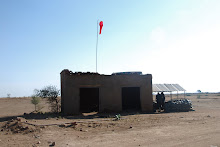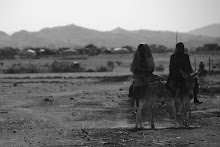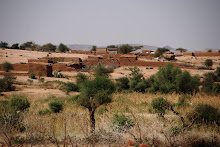The expulsion of aid groups from Darfur will have important consequences not only for beneficiaries, but for the very future of humanitarian action worldwide.
Public debate on the expulsions of 13 NGOs has so far focused on the immediate humanitarian consequences – a possible meningitis outbreak, water supply and food distribution gaps, mass population movements, etc - and calls for the Government of Sudan to reverse its decision.
But the fact that the international community is calling for a reversal of the expulsions rather than pursuing legal recourse, reveals a deeper issue at the heart of the controversy - namely, the ambiguous legal status of today’s humanitarian organizations and their work.
Humanitarian assistance is enshrined in international law, but so limited as to be unrecognizable to those familiar with the operations of today’s multi-billion dollar a year industry.
For one, the Geneva conventions guarantee the right of the populations to receive life-saving assistance, but not the right of givers to give such aid. So, theoretically, a government could refuse humanitarian assistance from some actors if the populations’ needs were met by another group.
But the world seems to have moved beyond a limited interpretation of humanitarian assistance as meeting the immediate needs of suffering populations to view humanitarian organizations as moral arbitrators, public-opinion makers, and the embodiment of an international consciousness - both speaking out and acting against wrongs.
As a result, many of today’s organizations are walking on a tight-rope between neutrality and advocacy, between serving the immediate needs of populations, and trying to influence the root causes of suffering by speaking out against violations.
For aid agencies that remain on the ground in Darfur who must now decide whether to remain, expand, or retreat, the expulsions have spurred soul-searching as to exactly which role they should play. This is a critical opportunity for the international community to reflect on the changing role of humanitarian organizations in the technology-saturated global village of the 21st century - answering such questions as:
Can confidentiality exist in a world of digital photos? (During the Abu Graib scandal, once the photos of torture were release, ICRC was severely criticized for not speaking out about the abuses earlier)
Can we speak locally in a world of global polarization? (moderate statements designed to influence local political actors to improve the humanitarian situation can be taken out of context and manipulated by extremists on both sides to influence the political process)
Can apolitical agencies effectively separately themselves from hybrid political-military-humanitarian interventions such as exist in Afghanistan, Iraq, Darfur and Congo? (if NGOs are seen as being ‘too Western,’ perhaps because their headquarters are in Europe, they may be perceived as part of a military intervention and hence a legitimate target for reprisals or attack)
Tension has been building on the subject ever since the 1970s when ex-ICRC staff, disgruntled with the strict speech embargo placed on the organization’s employees during the Biafra war, founded MSF and chartered a new course for humanitarianism that both meets needs and raises awareness of disasters.
And for the past two decades, in the age of celebrity activism, you-tube, and terrorism, humanitarians have struggled to play a role of ‘pragmatic neutrality’ -operating with sufficient discretion to “maintain the appearance on non-involvement in the politics of conflict (HPG Report),” but conducting sufficient public advocacy to maintain a seat at the policy table, secure funding, or influence the root causes of war.
This leads us to the slightly ironic situation in which aid groups have been accused of taking a stand on politics and security and have been evicted from the country (perhaps having chosen to emphasize the political over the humanitarian), and the UN Security Council, entrusted with maintaining international peace and security, has issued a statement stressing the reverse, namely, the importance of the humanitarian over the political. Yesterday, the Security Council, unable to reach consensus earlier this month on a statement vis a vis the ICC, instead stressed the importance of "continuing the distribution of humanitarian assistance to all the needy in Darfur."
This is a golden opportunity to transform the chaos of Darfur into more clarity for international humanitarian law.
Saturday, March 28, 2009
Subscribe to:
Post Comments (Atom)













































No comments:
Post a Comment